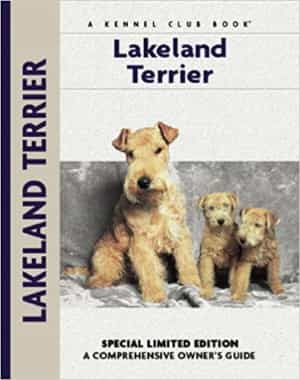Lakeland Terriers - Feisty Companions!
As a squarely built working breed, the Lakeland Terriers have been used extensively by farmers over the years to hunt and kill foxes and eradicate vermin that threatened livestock.
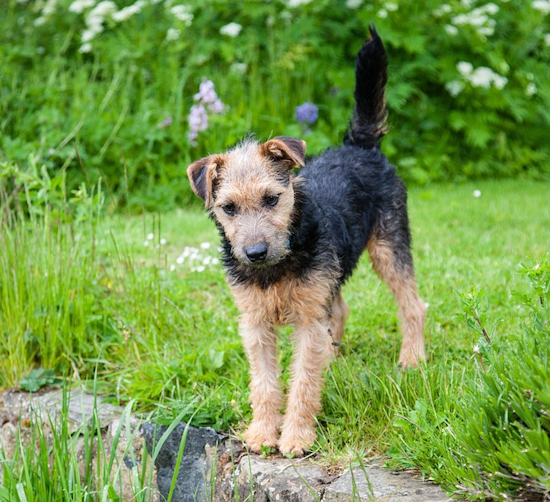
One advantage of this smaller sized terrier, is that they are able to dig and enter deep within dens to pursue and rout out
their quarry, although occasionally, they would get stuck in a burrow and had to be blasted out!
Lakeland Terriers have a reputation for being fearless and tough dogs, never intimidated by facing much larger prey.
The breed originated in the north of England in area known as the Lake
District which is part of the county of Cumbria and is one of the oldest
breeds of working terriers that exists today.
Its development is believed to include the Black and Tan, Border,
Bedlington and Dandy Dinmont terriers. Prior to its current name which
it acquired in 1912, it was known as the Patterdale Terrier or Fell
Terrier, as well as the Westmoreland Terrier.
Many liken its appearance to that of the Wire Fox Terrier.
This breed has a very outgoing personality and has earned the distinction of winning two major dog shows in
the same year - Crufts and Westminster - which it did in 1967.
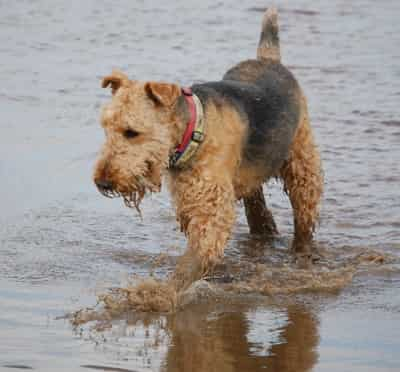 Lakeland Fun in the Water
Lakeland Fun in the WaterLiving With Lakeland Terriers
The Lakeland Terrier is a self-confident and smart dog. He is also very cheerful, affectionate
and mischievous.
The earth dog traits of digging and tunneling are more pronounced in this
breed, emphasizing the need for secure fencing of property. This may likely include the addition
of chicken wire underground.
Lakelands are very alert and prone to bark at any disturbances.
While this makes them ideal watchdogs, teaching them the "quiet" command early on, will keep the
neighbors on more friendly terms. A Citronella Spray Collar can be useful in discouraging barking.
This breed likes to be dominant, but is also very loyal. Owners should
be strong leaders and establish themselves in the "alpha" role right
away! Training needs to be firm, fair
and consistent - no wavering.
Adding variety to the training routines will keep this intelligent dog from getting bored.
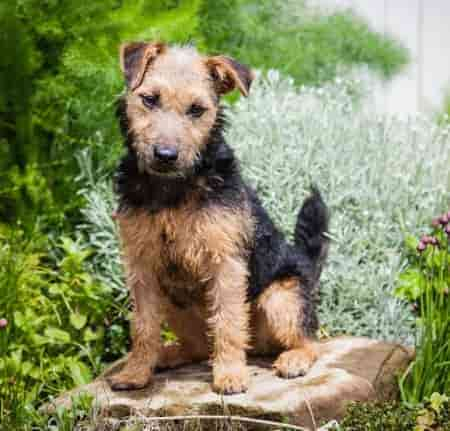
Physical Stats And Coat Care
Height: 13-15 inches
Weight: 15-17 lbs.
Color variations acceptable to AKC: Ranging
from mostly Black, Black and Tan, Blue and Tan,
Wheaten,
Dark Grizzle, Grizzle,
Grizzle and Tan, Liver and Tan, Red, Red Grizzle
Group: Terrier
Lifespan: 12 to 15 years
The Lakeland Terrier has a double coat, the top coat being hard, dense, wiry and weatherproof, while the undercoat is soft.
Because shedding is minimal, regular grooming is necessary to remove
the loose hair that stays within the outer coat and undercoat. A pet stripper or a stripping knife are perfect tools for the job and result in a show-quality finish to the coat.
A terrier palm pad is another excellent tool for overall grooming of terrier coats.
While stripping is the only way to go for pets being readied for shows, companion dogs can be groomed with clippers,
but the wiry texture/look of the coat will ultimately be lost.
The low-shedding feature of this breed makes it a good choice for allergy sufferers.
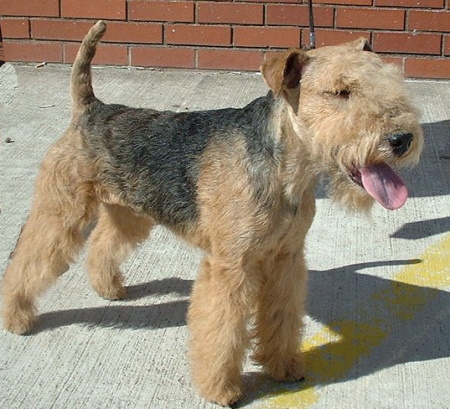 Wikimedia Courtesy Sannse
Wikimedia Courtesy SannseHealth Issues
Overall Lakeland Terriers are generally a very healthy dog breed and there are no known heredity conditions associated with them.
Some health conditions, common to most dogs, may be seen in the late senior years of the Lakeland and include:
- Eye Issues
- Heart Disease
- Patella Luxation
The United States Lakeland Terrier Club conducted a health survey Of the breed in 2020. You can view the results here.
While no specific health testing has been indicated by the Club, keeping up the dental health of your dog is always an important preventative measure to avoid infections that can lead to serious health issues.
With adequate exercise, a high quality diet and the benefit of regular oversight from a veterinarian, pet parents can enjoy the Lakeland for up to 15 years.
If you are interested in acquiring a Lakeland puppy, the Club has a breeders list to help you find one in your area of the country.
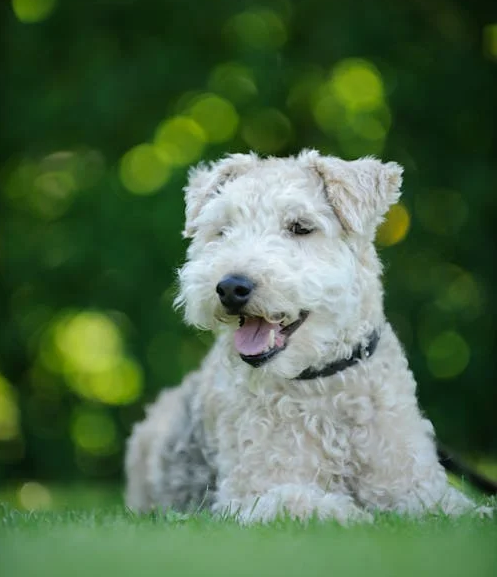
How Active Is This Breed?
Lakeland Terriers are very active dogs and should have plenty of opportunity for long walks -
always on a leash. Like most dogs of intelligence, he also likes to be mentally challenged.
Today many puzzle toys have been invented to give smart dogs a mental workout. They are available from easy to advanced levels of difficulty.
Choose one to give your Lakeland something to figure out and keep him entertained at the same time.
Ideal Living Space
Lakeland Terriers have a strong prey drive and high energy level which a calls for a home with a securely fenced yard.
This would also be ideal for training, games of play, and using up energy at times when walks are not possible.
Does The Lakeland Get Along With Children?
The Lakeland Terrier, in general, is not tolerant of inconsiderate children.
They do better with young adults who can keep up with their energy level and who will not mishandle them.
Suitable Companion for Seniors?
He's a perky and lively dog best suited to families that are more
active. On the other hand, seniors that are very active and enjoy a lively companion - maybe!
Those who prefer a more sedentary lifestyle, would not be a suitable match for the Lakeland Terrier.
Tell Us About Your Lakeland
Do you have a wonderful, energetic Lakeland you'd like to tell the world about?
We invite you to share your knowledge about this spunky and special terrier? Pictures would be great too?
Our visitors love dog stories and pics, so we've made it quick and easy for you to brag about your dog with
us and them. Just go here to get started. It's fun!
We can't wait to have your dog join our community!
Before You Go...
If you like the content of this page, as well as others on my site, please give it some love by clicking on the heart in the lower right hand corner. This helps me to keep providing enjoyable and useful content.
Thank you.
Book Recommendation
Covers breed history, characteristics, puppy selection, feeding, training, health care and behavior. Also has advice about preparing for a puppy, house training and potential puppy problems. Many color photos.
Image:: https://commons.wikimedia.org/wiki/File:Lakeland_Terrier.jpg License: http://creativecommons.org/licenses/by-sa/3.0/
Other images: Pixabay, Pexels and Pxhere

